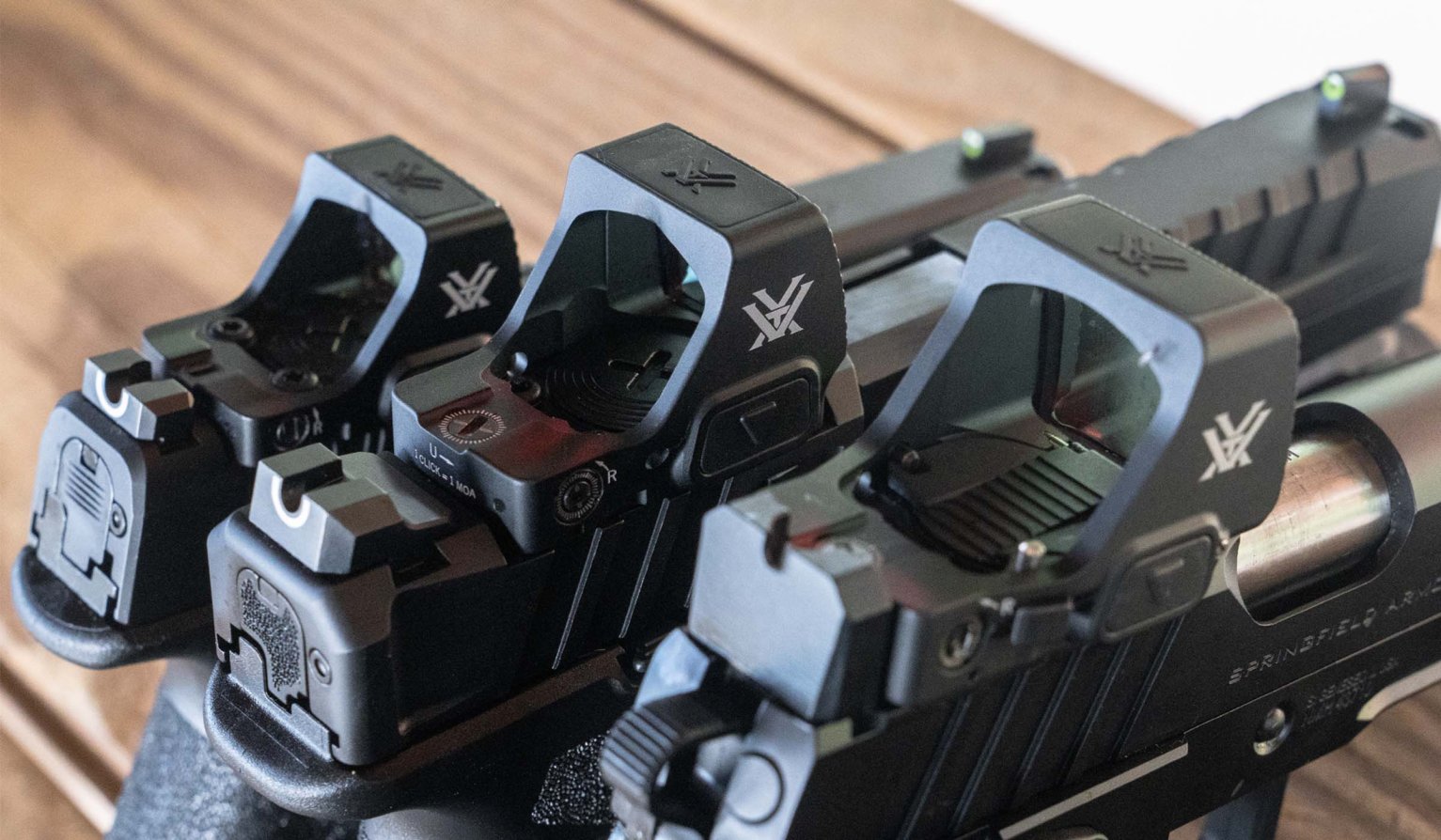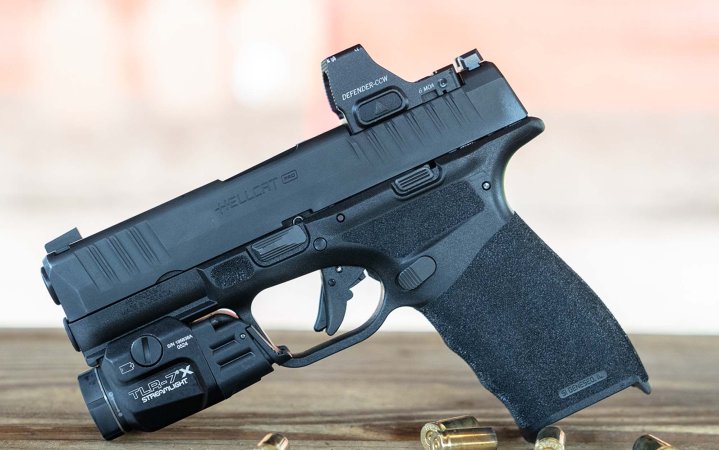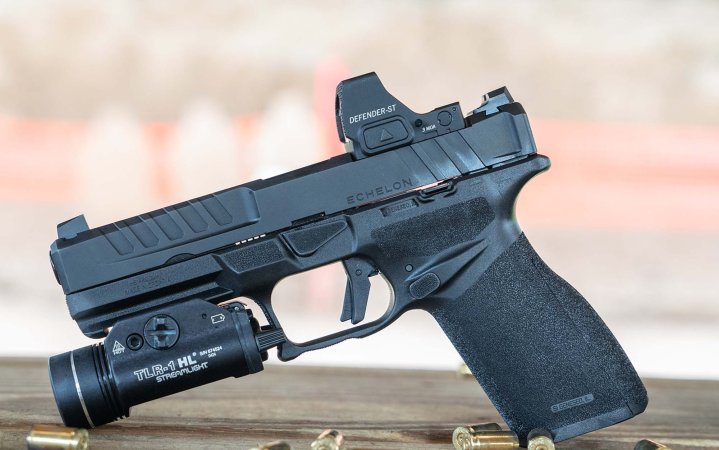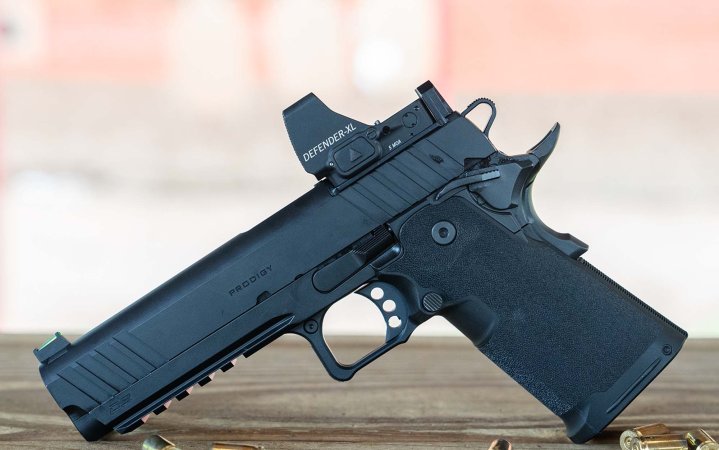We may earn revenue from the products available on this page and participate in affiliate programs. Learn More ›
The latest trend for pistol red dots is using different window sizes to match specific use cases. There are options with large windows for quick target acquisition, small windows for concealed carry, and the Goldilocks-size that does everything well. Vortex launched their concealed-carry focused Defender-CCW last year and this year added two new red dots to offer a full range of window sizes.
I got my hands on one of each to run them side by side. I tested their durability, precision, and overall user experience based on their intended roles. After a few weeks with the Defender-ST and Defender-XL, and more than a year with the Defender-CCW, I have a clear understanding of what these optics are all about and can help you decide which is best for your pistol.
How I Tested the Vortex Defender Red Dots

I started by mounting the optics to three pistols and assessed if they were easy to install. The process was a breeze. Vortex includes all the individually labeled mounting hardware (complete with pre-applied blue thread-locker), tools, and instructions you need.

Then came my initial shakedown of dry fire and durability testing. I don’t intentionally try to break products when I do this but I do want to confirm that they can stand up to reasonable abuse. With the dot mounted on an unloaded gun, I dropped them from waist height onto concrete. I also did lots of racking the slide with the optic. I repeated the tests between strings of live fire to check for zero shift.
After establishing zero and shooting five-round groups to check for accuracy, I moved on to a series of 7-yard drills including the Bill Drill, El Presidente, and Failure to Stop. Each time, I shot all three pistols one after another in rapid succession to reveal how the optics differed. All in all, I fired hundreds of rounds in addition to what I’ve already shot with the Defender-CCW during the past year.
Assisting me in this was a trio of 9mm pistols from Springfield Armory: a Hellcat Pro, an Echelon, and a Prodigy. I also used Safariland and Tier 1 Concealed holsters and lights from Streamlight to see how well the optics fit into a standard holster and how well the reticles show up against a bright pistol light.
Testing the Defender Red Dots on the Range
Defender-CCW
- Reticle: 3 MOA, 6 MOA
- Dot Color: Red
- Mounting Footprint: Shield RMSc
- Adjustment Increment: 1 MOA
- Battery: CR1632
- Window Size: 0.8 inches wide x 0.7 inches tall
- Weight: 0.95 ounces
OL gear editor, Scott Einsmann, tested the CCW when it first launched. He put it through the wringer and it earned high marks for durability, ease of use, and a remarkably crisp dot.
I’m more than a year into my time with a 6-MOA Defender-CCW and my long-term test unit hasn’t missed a beat. I dropped it optic-first onto concrete and suffered nothing but a scratched chassis. I drew from inside my coat in freezing temperatures and observed no fog on the lens. I put thousands of rounds through the Springfield Hellcat Pro it’s mounted on and have never needed to adjust my zero. Simply put, it’s as tough as I want a concealed-carry optic to be.
Despite the toughness it showed during my drop tests, it still keeps a low profile and weighs in at less than an ounce. I typically carry appendix, and the Defender-CCW is comfortable and doesn’t print through a T-shirt.
Mounting a red dot on your CCW pistol is somewhat controversial because its size is so important. When you’re trying to avoid printing and discomfort, every additional square inch is problematic. But building speed with a window this small takes some training, though it can be done (it’s faster than iron sights for me). Give yourself a few minutes of dry fire every day to sort this out.
Read Next: Best Dry Fire Training Systems
Defender-ST
- Reticle: 3 MOA, 6 MOA
- Dot Color: Red
- Mounting Footprint: DeltaPoint Pro
- Adjustment Increment: 1 MOA
- Battery: CR2032
- Windsor Size: 0.9 inches wide x 0.8 inches tall
- Weight: 1.48 oz.
- MSRP: $469.99
For starters, the Defender-ST uses the DeltaPoint Pro mounting footprint instead of the Shield RMSc footprint. That makes it compatible with a wide range of full-size pistols like the Springfield Armory Echelon I tested it with, as well as popular pistols like the Glock 17 Gen5 MOS.

The duty-focused big brother gets more elevation and windage travel. It’s about half an ounce heavier and takes a larger battery that results in a claimed run time of 25,000 hours – more than double that of the Defender-CCW. It comes with 10 daytime brightness settings instead of eight in addition to two night-vision brightness settings. You get the same reticle options: 3-MOA or 6-MOA.
The window is barely larger – just 0.1 inches in each direction – but that 12.5 percent increase makes a noticeable difference. When I was shooting drills at seven yards, I needed less time to get on target and transition between targets because of the larger window.
It’ll come as no surprise that this is the Goldilocks of the bunch. It’s fast, accurate, and tough. It’s small enough that anyone who’s willing to carry a full-size pistol wouldn’t be bothered by it, but large enough to run quickly.
I’d also recommend the Defender-ST to anyone who plans on putting one of these optics on something other than a pistol. Need a backup optic for your carbine? Put a Defender-ST on top of your LPVO or mount it on a 45-degree offset, and call it a day. Got an optic-ready turkey gun? The Defender-ST is the right size for that, too.
Defender-XL
- Reticle: 5 MOA, 8 MOA
- Dot Color: Red
- Mounting Footprint: DeltaPoint Pro
- Adjustment Increment: 1 MOA
- Battery: CR2023
- Window Size: 1 inch wide x 0.9 inches tall
- Weight: 1.93 oz.
- MSRP: $599.99
Vortex just released the third addition to the new line of pistol red dots: the Defender-XL. This one has a window so big you could watch Monday Night Football on it.
Two notable differences are the Defender-XL’s reticle and battery compartment. Instead of 3- and 6-MOA models, you can pick from 5-MOA or 8-MOA dot. The battery compartment still loads from the top, there’s just a set screw and button holding the cap in place rather than threads.
If an inch doesn’t sound big, consider this: The Defender-CCW’s entire housing could fit inside the glass of the Defender-XL. On a pistol, the two are worlds apart. It even makes the Defender-ST look tiny.
Every time I shot the Bill Drill, the Defender-XL’s oversized viewing area meant that I could acquire the bright 5-MOA dot sooner, track my dot through recoil, and see more of my target than I would with a standard-sized optic. This was even more noticeable when engaging multiple targets. During the Failure to Stop drill, I felt like time slowed because I had more opportunity to watch each target come into my field of view and mentally prepare for the next shot.

That makes sense because this optic is built for competitive shooters who are happy to slap a billboard-sized piece of glass on their slide if it shaves a hundredth of a second off their time.
Are there any drawbacks? It might seem counterintuitive that a competition red dot would come with the largest reticles: 5 MOA or 8 MOA. This makes the Defender-XL fast but it does so at the expense of precision, especially beyond 25 yards or more. The 5 MOA dot will cover 2.5 inches at 50 yards. So, if your version of competitive shooting involves key-holing shots during strings of slow fire, step down to a Defender-ST with a 3-MOA dot.
There are lots of optics that are as tough as the Defender-XL and some that are just as big. What makes it unique is the combination of strength and size. I had the Defender XL mounted on my Sprinfield Prodigy which weighs 33 ounces. Drop-testing it with that boat anchor didn’t result in any damage or shift in zero. It’s not a range toy that you have to baby; it’s every bit as rugged as the other two.
FAQs
The Vortex Defender-CCW uses the Shield RMSc footprint. The Defender-ST and Defender-XL use the DeltaPoint Pro footprint.
Smaller dots allow for more precision but might take longer for your eye to pick up. If you’re not sure which one to pick, you can hedge the difference by cranking up the brightness on a 3-MOA dot to make it appear larger if you need to.
Final Thoughts on the Vortex Defender Line

There was a time when pistol optics were a (relative) weak point in the Vortex product catalog. That’s no longer the case. I’d love to see manufacturing move stateside, but that’s about the only criticism I have. The entire Defender line left me impressed, and the fact that these optics are priced so competitively makes the prospect of screwing one to your pistol even better.



